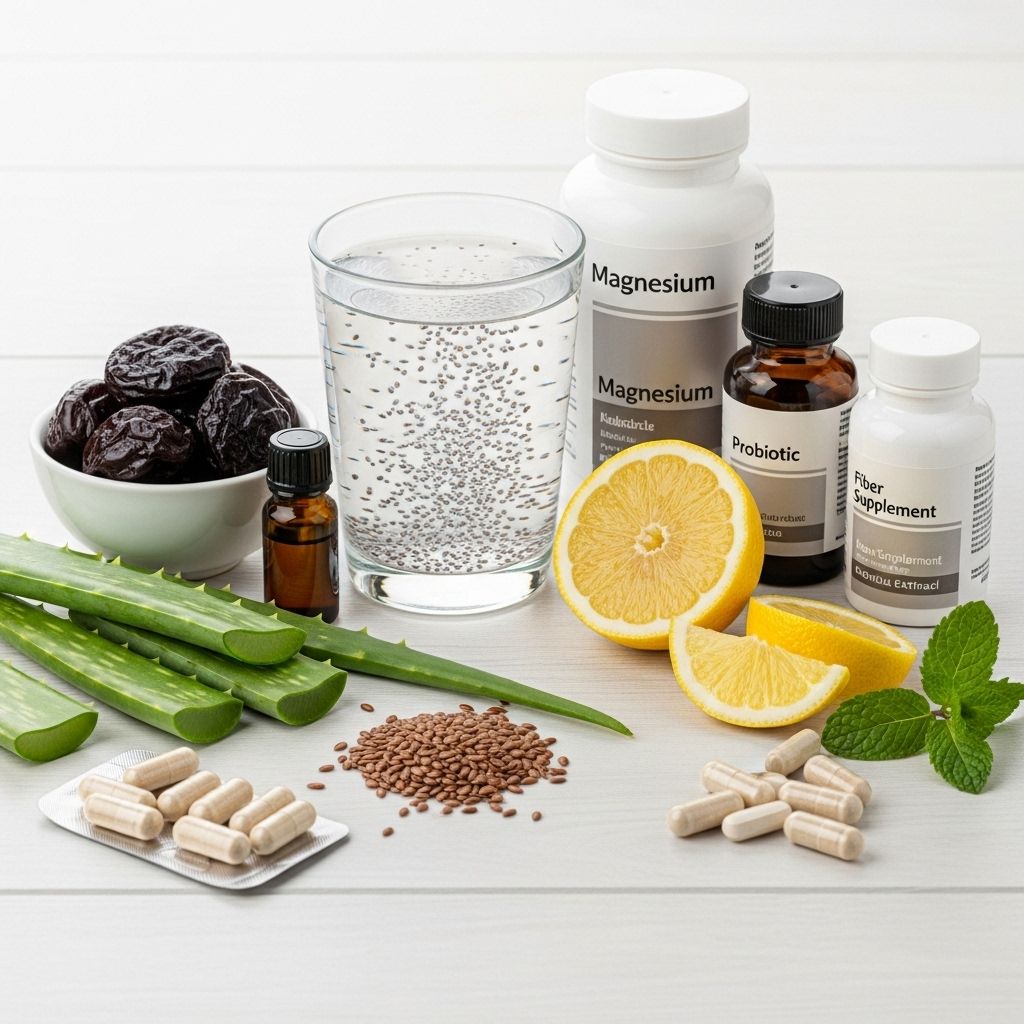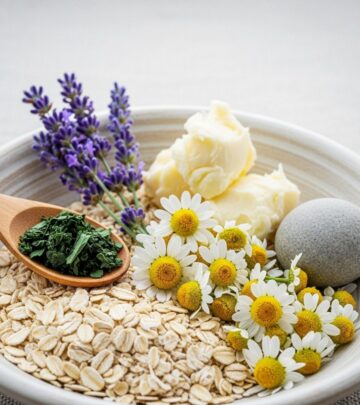Natural Remedies and Supplements for Constipation Relief
Explore effective natural remedies, lifestyle tips, and supplements for lasting constipation relief and improved digestive health.

Constipation is a common digestive issue affecting individuals of all ages. It involves infrequent, difficult, or painful bowel movements and can significantly impact quality of life. Fortunately, a range of natural remedies, dietary measures, and supplements can help relieve constipation and promote healthy digestion, often without the need for prescription medication.
Understanding Constipation
Constipation typically refers to fewer than three bowel movements per week, accompanied by hard or dry stools, straining, bloating, and a sensation of incomplete evacuation. It can be acute (short-term) or chronic (long-lasting). Causes include low fiber intake, dehydration, inactivity, stress, side effects of certain medications, and changes in daily routine.
Effective Natural Remedies for Constipation
Increase Dietary Fiber Intake
Dietary fiber adds bulk to the stool and helps it move more easily through the digestive tract. Most adults require at least 22–34 grams of fiber daily; however, many consume far less. Gradually increasing fiber intake can relieve and prevent constipation.
- Whole grains: oats, whole wheat bread, brown rice, and quinoa
- Legumes: beans, lentils, chickpeas, and peas
- Fruits: apples, pears, prunes, berries, kiwis, and apricots
- Vegetables: carrots, broccoli, spinach, and leafy greens
Introduce fiber gradually and pair it with increased fluid intake to minimize bloating and discomfort.
Stay Hydrated
Drinking enough fluids softens the stool and supports optimal bowel function. Aim for at least 6 to 8 glasses (about 2 liters) of water daily. Other beneficial fluids include herbal teas, clear broths, and diluted fruit juices. Limit high-sugar and caffeinated drinks, which can contribute to dehydration.
Physical Activity
Regular movement stimulates the natural contractions of the colon, encouraging regular bowel movements. Even moderate activities, such as walking, yoga, or cycling, can make a difference. Aim for at least 30 minutes of physical activity most days of the week.
Establish a Healthy Bowel Routine
- Set aside time each day after meals for a relaxed bathroom visit, as eating activates the colon.
- Respond promptly to the urge to have a bowel movement.
- Support your feet slightly with a stool while sitting on the toilet to improve positioning.
Powerful Foods and Natural Laxatives
Several foods act as gentle, natural laxatives to help relieve constipation:
- Prunes and Prune Juice: Rich in fiber and sorbitol (a natural sugar alcohol), prunes have a well-established laxative effect. A daily serving can often resolve mild constipation.
- Kiwi: Contains actinidin, an enzyme that supports upper gastrointestinal motility. Clinical studies suggest two kiwis per day can improve stool frequency and consistency.
- Apples and Pears: Both fruits are high in fiber, water, and fructose, which can help soften stools and stimulate bowel movements.
- Berries: Blackberries and raspberries supply soluble fiber and hydration when eaten fresh and raw.
- Stewed Apricots: Cooking apricots with a little water enhances their natural laxative effect while making them easy to digest.
- Yogurt & Kefir: These probiotic-rich dairy foods help balance gut flora and soften stools by increasing water absorption in the colon.
- Pulses: Beans, peas, chickpeas, and lentils are full of fiber, zinc, folate, potassium, and vitamin B6, all supporting healthy digestion.
- Grapes: High in water and fiber, grapes serve as a tasty and effective snack for supporting gut health.
| Food | Key Benefits | How to Use |
|---|---|---|
| Prunes | Fiber, sorbitol | Eat whole or as juice |
| Kiwi | Actinidin enzyme, fiber | Eat raw, 1-2 daily |
| Pears | Fructose, fiber | Eat raw; keep the skin |
| Stewed Apricots | Soluble fiber | Cook with little water and sugar |
| Yogurt & Kefir | Probiotics | Eat daily for gut health |
Herbal and Natural Ingredients for Relief
- Lemon Juice: Adding lemon juice to warm water (especially in the morning or before bed) can stimulate digestion and aid natural cleansing. Lemons are rich in vitamin C and antioxidants, further supporting digestive function.
- Olive Oil: Consumed on an empty stomach (one teaspoon), olive oil lubricates the intestines, making passage easier for stools. It also helps soften stool consistency.
- Fennel Seeds: Fennel, used as a tea or roasted and added to foods, relaxes the gut, increases gastric enzyme secretion, and can act as a gentle laxative.
- Ginger Tea: Ginger promotes healthy digestion and has mild laxative properties. Ginger tea, in particular, can be soothing for abdominal discomfort and bloating associated with constipation.
- Sauerkraut: A fermented food packed with probiotics, sauerkraut helps balance gut bacteria, promoting regularity and softer stools.
Supplements for Constipation Relief
Some supplements may be useful, especially if dietary changes alone are insufficient:
- Psyllium Husk: A soluble fiber supplement that absorbs water to form a gel, softening stools and increasing their size. Take with plenty of water to avoid blockage.
- Magnesium Citrate: An osmotic laxative that draws water into the colon, stimulates bowel movements, and can offer reasonably fast relief. It’s available over the counter, but excessive use can lead to electrolyte imbalance.
- Omega-3 Oils: Found in fish oil, flaxseed oil, and hemp seed oil, these healthy fats lubricate the bowel walls, facilitating easier passage of stool. If dietary intake is inadequate, supplements are widely available.
- Probiotics: Strains such as Lactobacillus and Bifidobacterium enhance gut microbiome diversity, which in turn aids digestion and eases constipation. Regular use of probiotics (through supplements or fermented foods) is beneficial for ongoing gut health.
Note: Always consult a healthcare professional before starting any new supplement, especially for children, elderly, or those with chronic illnesses.
Lifestyle Changes and Additional Tips
- Reduce highly processed foods: Minimize intake of refined products (such as white bread and pasta), processed meats, and fried foods, which lack fiber and may worsen constipation.
- Limit dairy if intolerant: People with lactose intolerance may experience constipation. Try reducing or eliminating milk products to see if symptoms improve, and rely on non-dairy sources for calcium and vitamin D.
- Practice stress management: High stress and anxiety can negatively impact bowel function. Incorporate relaxation techniques, such as meditation, deep breathing, or yoga.
- Create a comfortable bathroom environment: Allow time and privacy for a regular bowel routine. Supporting the feet with a small stool can help align the colon for easier elimination.
Natural Remedies for Children
Constipation is common in children and usually resolves with gentle interventions. The following steps can offer relief:
- Encourage water and fiber-rich fruits like apples, pears, and prunes.
- Teach healthy toilet habits, including taking time and having proper foot support.
- Use gentle abdominal massage and leg bicycling exercises, particularly for infants.
- Minimize intake of excessive dairy or processed snacks that are low in fiber.
Always consult with a pediatrician if constipation persists or is accompanied by vomiting, fever, or extreme discomfort.
When to Seek Medical Advice
While most cases of constipation resolve with home remedies and lifestyle changes, see a healthcare provider if:
- Constipation is persistent (lasting more than three weeks).
- There is severe pain, blood in the stool, or unexplained weight loss.
- Constipation alternates with episodes of diarrhea.
- There is a sudden change in bowel habits without an obvious cause.
Frequently Asked Questions (FAQs)
Q: What are the best foods to relieve constipation quickly?
A: Foods high in fiber and water content—such as prunes, kiwi, apples, pears, blackberries, and whole grains—can naturally stimulate bowel movements and provide fast relief for mild constipation.
Q: Can supplements help if natural remedies fail?
A: Yes, supplements like magnesium citrate, psyllium husk, and probiotics can help, but it’s best to use them under the guidance of a healthcare professional, particularly in chronic or severe cases.
Q: How much water should I drink to prevent constipation?
A: Aim for 6 to 8 glasses (roughly 2 liters) of water daily, more if physically active or in hot weather. Sufficient fluid intake is essential for maximizing fiber’s benefits.
Q: Are all dairy products bad for constipation?
A: Not for everyone. Dairy can cause constipation in those with lactose intolerance. If you suspect dairy is an issue, reduce consumption and monitor for improvement, while maintaining adequate calcium intake from other sources.
Q: Are there any risks to using natural remedies?
A: When used sensibly, most natural remedies are safe. However, excessive fiber or supplement use can cause bloating, cramping, or dependence. If symptoms worsen or new symptoms appear, consult a healthcare provider.
Key Takeaways for Constipation Relief
- Most constipation can be managed at home with increased fiber, fluids, physical activity, and natural remedies.
- Prunes, kiwis, apples, pears, and probiotics are especially effective foods.
- Magnesium citrate, psyllium husk, and omega-3 oil supplements can help but should be used with caution.
- Long-term or severe constipation warrants medical evaluation.
Adopting these natural strategies can significantly improve bowel regularity, comfort, and overall digestive health. Combine a balanced diet, sufficient hydration, and healthy lifestyle choices to maintain lasting results.
References
- https://www.bladderandbowel.org/bowel/bowel-treatments/8-remedies-to-relieve-constipation-bladder-bowel-community/
- https://www.templehealth.org/about/blog/doctor-approved-home-remedies-constipation
- https://www.unitypoint.org/news-and-articles/home-remedies-for-constipation-in-kids
- https://www.medicalnewstoday.com/articles/318694
- https://www.health.harvard.edu/newsletter_article/natural-ways-to-relieve-constipation
- https://www.mayoclinic.org/diseases-conditions/constipation/diagnosis-treatment/drc-20354259
- https://my.clevelandclinic.org/health/diseases/4059-constipation
- https://www.nhs.uk/conditions/constipation/
- https://www.niddk.nih.gov/health-information/digestive-diseases/constipation/treatment
Read full bio of Sneha Tete












